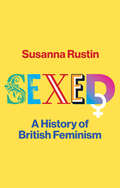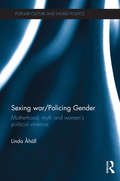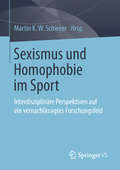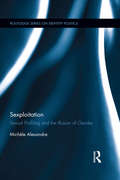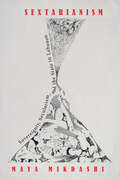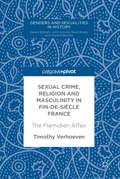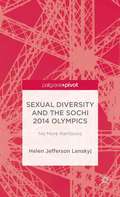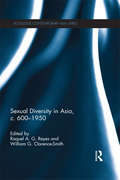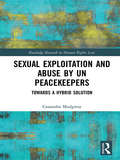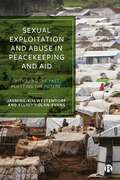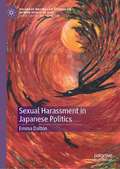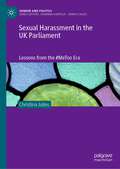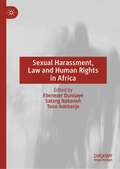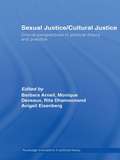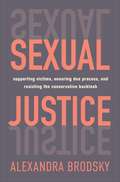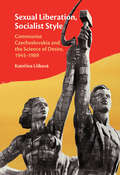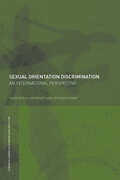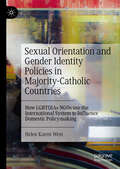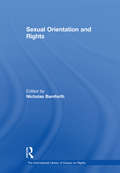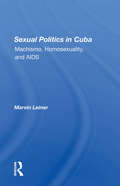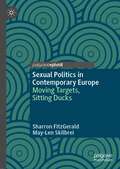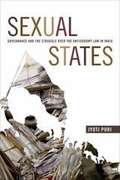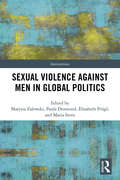- Table View
- List View
Sexagon: Muslims, France, and the Sexualization of National Culture
by Mehammed Amadeus MackHonorable Mention, Association for Middle East Women’s StudiesHonorable Mention, 2018 Arab American Book Awards (Non-Fiction)In contemporary France, particularly in the banlieues of Paris, the figure of the young, virile, hypermasculine Muslim looms large. So large, in fact, it often supersedes liberal secular society’s understanding of gender and sexuality altogether. Engaging the nexus of race, gender, nation, and sexuality, Sexagon studies the broad politicization of Franco-Arab identity in the context of French culture and its assumptions about appropriate modes of sexual and gender expression, both gay and straight.Surveying representations of young Muslim men and women in literature, film, popular journalism, television, and erotica as well as in psychoanalysis, ethnography, and gay and lesbian activist rhetoric, Mehammed Amadeus Mack reveals the myriad ways in which communities of immigrant origin are continually and consistently scapegoated as already and always outside the boundary of French citizenship regardless of where the individuals within these communities were born. At the same time, through deft readings of—among other things—fashion photography and online hook-up sites, Mack shows how Franco-Arab youth culture is commodified and fetishized to the point of sexual fantasy.Official French culture, as Mack suggests, has judged the integration of Muslim immigrants from North and West Africa—as well as their French descendants—according to their presumed attitudes about gender and sexuality. More precisely, Mack argues, the frustrations consistently expressed by the French establishment in the face of the alleged Muslim refusal to assimilate is not only symptomatic of anxieties regarding changes to a “familiar” France but also indicative of an unacknowledged preoccupation with what Mack identifies as the “virility cultures” of Franco-Arabs, rendering Muslim youth as both sexualized objects and unruly subjects.The perceived volatility of this banlieue virility serves to animate French characterizations of the “difficult” black, Arab, and Muslim boy—and girl—across a variety of sensational newscasts and entertainment media, which are crucially inflamed by the clandestine nature of the banlieues themselves and non-European expressions of virility. Mirroring the secret and underground qualities of “illegal” immigration, Mack shows, Franco-Arab youth increasingly choose to withdraw from official scrutiny of the French Republic and to thwart its desires for universalism and transparency. For their impenetrability, these sealed-off domains of banlieue virility are deemed all the more threatening to the surveillance of mainstream French society and the state apparatus.
Sexed: A History of British Feminism
by Susanna RustinSusanna Rustin's Sexed is a radical retelling of the story of British feminism. Starting in the revolutionary 1790s and ending in the present day, she introduces the 1830s radicals who demanded “LIBERTY FOR EVER!”, Victorian petitioners who expected to be dead before women won the vote, and rival camps of suffragists who embraced and rejected violence. She considers the contributions of the first female MPs, as well as activists including the Greenham peace protesters and the black and Asian women’s groups of the 1970s and 1980s.Her goal? To show how successive generations have fiercely contested what it means to be a woman, and why this matters. Biology on its own is not destiny. But this book argues that differences between male and female bodies have always been feminist issues. While gender is a useful concept, women cannot be supported by a politics that forgets that they, like men, are sexed.
Sexing War/Policing Gender: Motherhood, myth and women’s political violence (Popular Culture and World Politics)
by Linda ÅhällHistorically, there has been reluctance, from mainstream IR scholars as well as feminists, to seriously engage with women’s agency in warfare. Instead, scholarship has tended to focus on women’s activism for peace or to ignore women’s agency altogether. This book rectifies this omission by exploring the cultural understanding of actors, agents and structures of war and how can we make sense of attitudes towards women, agency and war today. By using a poststructuralist feminist perspective and by analysing empirical cases from a Western ‘war on terror’ cultural context, Ahall argues that all types of stories are informed by ideas about motherhood and maternal reproduction as the foundation of sexual difference. This does not only mean that women are judged/read/valued based on the shape of their, maternalised, bodies, rather than what they actually do, but, it means that ideas about motherhood, not motherhood itself, function to police contemporary gender norms and contemporary understandings of agency in war. Overall, this book argues that maternalist war stories function to reiterate traditional heteronormative gender roles. This is how a ‘body politics’ of war is not only policing gender norms but actually writing ‘sex’ itself. The body politics of war told through maternalist war stories is a process in which the sexing of war means the policing of gender borders, with motherhood acting as the border agent. This work will be of interest to students and scholars in areas such as gender, political violence and international relations.
Sexismus und Homophobie im Sport: Interdisziplinäre Perspektiven auf ein vernachlässigtes Forschungsfeld
by Martin K.W. SchweerDas vorliegende Buch bündelt aktuelle Diskurse und Ergebnisse zu den noch immer weit verbreiteten Phänomenen des Sexismus und der Homophobie im Sport. Ausgehend von einem zusammenführenden Überblick über den Status Quo der Forschung werden aus interdisziplinärer Perspektive ausgewählte inhaltliche Schwerpunkte und Handlungsfelder thematisiert, wie etwa sexistische und homophobe Tendenzen im Vereinssport, Spezifika der Fußballfanszene sowie die Analyse medialer Darstellungen und Inszenierungen zum Themenschwerpunkt ebenso wie die Analyse des Sportunterrichts mit seinem pädagogischen Potenzial. Auf diese Weise gelingt ein facettenreicher Einblick in ein Forschungsfeld, das bislang - nicht nur - im deutschsprachigen Raum zu wenig Beachtung gefunden hat.Der Inhalt• Grundlegende Überlegungen zu einem vernachlässigten Forschungsgegenstand• Ausgewählte Anwendungs- und ForschungsfelderDie ZielgruppenWissenschaftlerinnen und Wissenschaftler aus den diversen sozialwissenschaftlichen Disziplinen, Akteurinnen und Akteure im (organisierten) Sport und in pädagogisch-psychologischen HandlungsfeldernDer HerausgeberProf. Dr. Martin K. W. Schweer ist Universitätsprofessor für Pädagogische Psychologie und zugleich wissenschaftlicher Leiter der sportpsychologischen Arbeitsstelle „Challenges“ an der Universität Vechta.
Sexploitation: Sexual Profiling and the Illusion of Gender (Routledge Series on Identity Politics)
by Michèle AlexandreMichèle Alexandre’s innovative study examines how sexual profiling represses, oppresses, and hinders various aspects of life for both genders, and explores the ways in which the law and the community can help eradicate the practice of sexual profiling. Alexandre defines "sexploitation" as the perpetuation of myths and stereotypical notions regarding men and women in order to further an agenda of oppression and subordination in certain spheres of society. The most popular means through which this sexploitation is achieved is through a method Alexandre coins as "sexual profiling." She argues that sexual profiling ultimately stifles the growth of our society by creating inefficient as well as oppressive systems, and that its eradication can help increase the productivity as well as the morale of society. Alexandre opens the book by exploring in detail the various ways in which normative views of gender are constructed and perpetuated through media and societal norms. She then focuses on the ways in which recent legal opinions and developments contribute to perpetuate these restrictive and oppressive norms. Finally, Alexandre outlines a plan to help eliminate the presence of these destructive norms and attitudes from different sectors of society.
Sextarianism: Sovereignty, Secularism, and the State in Lebanon
by Maya MikdashiThe Lebanese state is structured through religious freedom and secular power sharing across sectarian groups. Every sect has specific laws that govern kinship matters like marriage or inheritance. Together with criminal and civil laws, these laws regulate and produce political difference. But whether women or men, Muslims or Christians, queer or straight, all people in Lebanon have one thing in common—they are biopolitical subjects forged through bureaucratic, ideological, and legal techniques of the state. With this book, Maya Mikdashi offers a new way to understand state power, theorizing how sex, sexuality, and sect shape and are shaped by law, secularism, and sovereignty. Drawing on court archives, public records, and ethnography of the Court of Cassation, the highest civil court in Lebanon, Mikdashi shows how political difference is entangled with religious, secular, and sexual difference. She presents state power as inevitably contingent, like the practices of everyday life it engenders, focusing on the regulation of religious conversion, the curation of legal archives, state and parastatal violence, and secular activism. Sextarianism locates state power in the experiences, transitions, uprisings, and violence that people in the Middle East continue to live.
Sexual Crime, Religion and Masculinity in fin-de-siècle France: The Flamidien Affair (Genders and Sexualities in History)
by Timothy VerhoevenThis book explores a vital though long-neglected clash between republicans and Catholics that rocked fin-de-siècle France. At its heart was a mysterious and shocking crime. In Lille in 1899, the body of twelve-year-old Gaston Foveaux was discovered in a school run by a Catholic congregation, the Frères des Écoles Chrétiennes. When his teacher, Frère Flamidien, was charged with sexual assault and murder, a local crime became a national scandal. The Flamidien Affair shows that masculinity was a critical site of contest in the War of Two Frances pitting republicans against Catholics. For republicans, Flamidien’s vow of chastity as well as his overwrought behaviour during the investigation made him the target of suspicion; Catholics in turn constructed a rival vision of masculinity to exonerate the accused brother. Both sides drew on the Dreyfus Affair to make their case.
Sexual Diversity and the Sochi 2014 Olympics: No More Rainbows
by Helen Jefferson LenskyjThis book examines Russia's 2013 anti-gay laws and their implications for the Sochi 2014 Olympics. Lenskyj argues that Putin's Russia and the International Olympic Committee wield power in similar ways, as evident in undemocratic governance, fraudulent voting processes, hypocrisy and absence of accountability.
Sexual Diversity in Asia, c. 600 - 1950 (Routledge Contemporary Asia Series)
by Raquel A. G. Reyes William G. Clarence-SmithNon-reproductive sex practices in Asia have historically been a source of fascination, prurient or otherwise, for Westerners, who being either Catholic or Protestant, were often struck by what they perceived as the widespread promiscuity and licentiousness of native inhabitants. Graphic descriptions, and pious denunciations, of sodomy, bestiality, transvestitism, and incest, abound in Western travel narratives, missionary accounts, and ethnographies. But what constituted indigenous sexual morality, and how was this influenced by Hinduism, Buddhism, Confucianism, Islam, and Christianity over time and place? What sex practices were tolerated or even encouraged by society, community, and religious ritual, and what acts were considered undesirable, transgressive and worthy of punishment? Sexual Diversity in Asia, c. 600-1950 is the first book to foreground same- sex acts and pleasure seeking in the histories of India, China, Japan, the Philippines, Thailand, and Indonesia. Drawing on a range of indigenous and foreign sources, the contributors, all renowned experts in their fields, shed light on indigenous notions of gender and the body, social hierarchies, fundamental ideas concerning morality and immorality, and episodes of seduction. The book illuminates - in striking case studies – attitudes toward non-procreative sex acts, and representations and experiences of same-sex pleasure seeking in the histories of Asia. This path-breaking book is an important contribution to the study of gender and sexuality in Asian cultures and will also interest students and scholars of world history.
Sexual Exploitation and Abuse by UN Peacekeepers: Towards a Hybrid Solution (Routledge Research in Human Rights Law)
by Cassandra MudgwaySexual exploitation and abuse by United Nations (UN) peacekeepers is not an isolated or recent problem, but it has been present in almost every peacekeeping operation. A culture of sexual exploitation and abuse is contrary to the UN’s zero-tolerance policy and has been the target of institutional reforms since 2005. Despite this, allegations of sexual abuse continue to emerge, and the reforms have not solved the problem. This book is a response to the continued lack of accountability of UN peacekeepers for sexual exploitation and abuse. Focusing on military contingent members, this book aims to analyse ways in which the UN can fill the accountability gap while taking a feminist perspective and emphasising the needs of victims, their communities, and the host state. This book directly challenges the status quo of relying on troop-contributing countries (TCCs) to hold their peacekeepers to account. It proposes first, the establishment of a series of hybrid courts, and second, a mechanism for dealing with victim rehabilitation and reparation. It addresses these topics by considering international and human rights law and will be of interest to researchers, academics, policymakers, and students with an interest in international criminal law, United Nations peacekeeping, and peace studies.
Sexual Exploitation and Abuse in Peacekeeping and Aid: Critiquing the Past, Plotting the Future
by Sarah Martin Dyan Mazurana Megan Daigle Henri Myrttinen Jane Connors Ai Kihara-Hunt Asmita Naik Nour Abu-Assab Nof Nasser-Eddin Junru Bian Emily Elderfield Sabrina White Alina Potts Ellie Kemp Leah Nyambeki Phoebe Donnelly Kathleen M JenningsIn 2003, the UN adopted a zero-tolerance policy on sexual exploitation and abuse by peacekeepers and aid workers. The policy arrived amid a series of scandals revealing sexual misconduct perpetrated against the very people peacekeeping and humanitarian missions were meant to protect. This edited collection, including contributions from academics and practitioners, highlights the challenges of preventing and responding to abuse in peacekeeping and aid work, and the unintended consequences of current approaches. It lays bare the structures of power, coloniality and racism that underpin abuse and hinder accountability while charting a path for future action. This eye-opening book will appeal to academics and students of the politics and practice of peacekeeping and humanitarianism, and to practitioners, policy makers and those working within the field.
Sexual Harassment in Japanese Politics (Palgrave Macmillan Studies on Human Rights in Asia)
by Emma DaltonSexual harassment in Japanese politics examines a problem that violates women’s human rights and prevents a flourishing democracy. Japan fares badly in international gender equality indices, especially for female political representation. The scarcity of women in politics reflects the status of women and also exacerbates it. Based on interviews with female politicians around the country from all levels of government, this book sheds light on the sexist and sometimes dangerous environments in Japanese legislative assemblies. These environments reflect and recreate broader sexual inequalities in Japanese society and are a hothouse for sexual harassment. Like many places around the world, workplace sexual harassment laws and regulations in Japan often fail to protect women from being harassed. Even more, in the ‘workplace’ of the legislative council, such regulations are typically absent. This book discusses what this means for women in politics in the context of a broader culture whereby victims of sexual violence are largely silenced.
Sexual Harassment in the UK Parliament: Lessons from the #MeToo Era (Gender and Politics)
by Christina JuliosThis book examines the phenomenon of sexual harassment in the UK Parliament and efforts to tackle it. The volume’s in-depth research unveils a political culture where sexual transgressions thrive. Its intersectional feminist perspective furthermore highlights multiple systems of gendered oppression perpetuating inequality. Britain’s experience is viewed against the global #MeToo movement and Hollywood’s Weinstein sex scandal. The book identifies ways to redress the status quo and challenges ahead, including a gender power gap, misuse of non-disclosure agreements to silence victims, and misogynistic organisational cultures.
Sexual Harassment, Law and Human Rights in Africa
by Ebenezer Durojaye Satang Nabaneh Toun AdebanjoThis book delves into the endemic and pervasive issue of sexual harassment in Africa, examining it as a gendered expression of power and a gross violation of human rights. It explores sexual harassment in various sectors, including domestic work, academia, and the informal economy, across a range of African countries. The book also highlights the sexual harassment experienced by vulnerable populations, such as internally displaced people, people with disabilities, and women and girls traveling by air. With a keen focus on the intersection of law, feminism, and human rights, the book analyzes the role of the courts and national human rights institutions in addressing sexual harassment, drawing lessons from other jurisdictions. This book is a must-read for researchers, policymakers, and civil society organizations interested in gender power relations and women‘s rights in Africa and beyond.
Sexual Justice / Cultural Justice: Critical Perspectives in Political Theory and Practice (Routledge Innovations in Political Theory #Vol. 23)
by Rita Dhamoon Barbara Arneil Monique Deveaux Avigail EisenbergThis key volume explores the relationship between cultural justice and sexual justice in multicultural societies in a new light. The authors challenge the framing of ‘feminism and multiculturalism’ as one of inevitable conflict, as well as the portrayal of liberal sexual equality and cultural rights as irreconcilable, moving the debate beyond the culture/gender impasse. Focusing on three theoretical themes from a feminist perspective: the meaning and role of culture and identity in politics the problem of autonomy in relation to culture and identity the crucial role of democracy in addressing the theoretical and practical problems raised by this set of issues. The diverse contributors break new theoretical ground by providing detailed engagement with the concrete experiences of women and minorities who are caught in the dilemmas of gender and cultural justice. The collected chapters address sexual/cultural justice in a range of different countries, offering illuminating case studies on Britain, South Africa, Canada, the Netherlands, Australia, Mexico, and the United States. Sexual Justice / Cultural Justice will be of strong interest to students and researchers working in the areas of gender and feminist theory, politics, law, philosophy and sociology.
Sexual Justice: Supporting Victims, Ensuring Due Process, and Resisting the Conservative Backlash
by Alexandra BrodskyA pathbreaking work for the next stage of the #MeToo movement, showing how we can address sexual harms with fairness to both victims and the accused, and exposing the sexism that shapes today's contentious debates about due processOver the past few years, a remarkable number of sexual harassment victims have come forward with their stories, demanding consequences for their assailants and broad societal change. Each prominent allegation, however, has also set off a wave of questions – some posed in good faith, some distinctly not – about the rights of the accused. The national conversation has grown polarized, inflamed by a public narrative that wrongly presents feminism and fair process as warring interests.Sexual Justice is an intervention, pointing the way to common ground. Drawing on core principles of civil rights law, and the personal experiences of victims and the accused, Alexandra Brodsky details how schools, workplaces, and other institutions can – indeed, must – address sexual harms in ways fair to all. She shows why these allegations cannot be left to police and prosecutors alone, and outlines the key principles of fair proceedings outside the courts. Brodsky explains how contemporary debates continue the long, sexist history of “rape exceptionalism,” in which sexual allegations are treated as uniquely suspect. And she calls on readers to resist the anti-feminist backlash that hijacks the rhetoric of due process to protect male impunity.Vivid and eye-opening, at once intellectually rigorous and profoundly empathetic, Sexual Justice clears up common misunderstandings about sexual harassment, traces the forgotten histories that underlie our current predicament, and illuminates the way to a more just world.
Sexual Liberation, Socialist Style: Communist Czechoslovakia and the Science of Desire, 1945–1989
by Kateřina LiškováThis is the first account of sexual liberation in Eastern Europe during the Cold War. Kateřina Lišková reveals how, in the case of Czechoslovakia, important aspects of sexuality were already liberated during the 1950s – abortion was legalized, homosexuality decriminalized, the female orgasm came into experts’ focus – and all that was underscored by an emphasis on gender equality. However, with the coming of Normalization, gender discourses reversed and women were to aspire to be caring mothers and docile wives. Good sex was to cement a lasting marriage and family. In contrast to the usual Western accounts highlighting the importance of social movements to sexual and gender freedom, here we discover, through the analysis of rich archival sources covering forty years of state socialism in Czechoslovakia, how experts, including sexologists, demographers and psychologists, advised the state on population development, marriage and the family to shape the most intimate aspects of people’s lives.
Sexual McCarthyism: Clinton, Starr, and the Emerging Constitutional Crisis
by Alan M. DershowitzDiscusses the issues at that time; the clarifications and comments are still of interest.
Sexual Orientation Discrimination: An International Perspective (Routledge IAFFE Advances in Feminist Economics)
by Lee Badgett Jeff FrankHaving recently authored one of the most significant books, Money, Myths and Change, in this exciting area of economics, Lee Badgett has now teamed up with Jeff Frank and a collection of international contributors to provide an analysis of sexual orientation discrimination on an international scale. Discrimination based on sexual orientation continues to fuel collective action, policy debates and academic scrutiny in many countries. For some time, sociologists and psychologists have studied sexual orientation discrimination in institutions and explored prejudices against lesbian, gay, bisexual, and transgender people in mainstream areas. Now economists have also begun to examine the experiences of lesbians, gay men and bisexuals in less traditional research sectors including the labour, housing, credit, and retail markets. This book includes sections on: wages and jobs discrimination across institutional contexts discrimination in cultural institutions including religion, education and sport addressing discrimination through public policies. Innovative and up-to-date this book is an essential read for postgraduate students studying in the areas of political economy, gender studies and feminist economics.
Sexual Orientation and Gender Identity Policies in Majority-Catholic Countries: How LGBTQIA+ NGOs use the International System to Influence Domestic Policymaking
by Helen Karen WestThis research contributes to scholarship on Lesbian, Gay, Bisexual, Transgender, Queer/ Questioning, Intersex and Asexual (LGBTQIA+) rights at the international level and how LGBTQIA+ non-governmental organisations (NGOs) use international channels to advance the cause domestically, with a focus on countries that have a strong presence and influence of the Catholic Church. Case studies include Ireland, Italy and Peru. Based on over fifty interviews, author Helen Karen West identifies how specialised LGBTQIA+ INGOs facilitate access to international channels for local NGOs and argues that by accessing transnational networks and utilising international NGOs to access United Nations&’ (UN) channels, local NGOs have a better chance of influencing domestic policy change in majority Catholic countries. She argues that it is necessary to consider an additional actor to predict outcomes more efficiently: the opposition, in this case, the Catholic Church and affiliated organisations, and its transnational network. West offers helpful insight into influencing domestic policies in countries with strong opposition to allow LGBTQIA+ organisations a better chance to succeed in their work and further the academic dialogue.
Sexual Orientation and Rights (The International Library of Essays on Rights)
by Nicholas BamforthDebate about the rights of sexual minorities, whether individuals or members of same-sex couples, has become an important issue for legislatures and courts in many constitutional democracies. This volume collects together some of the more significant writings in the debate, and reflects a variety of perspectives: liberal, conservative, and radical. The topics covered include the meaning and importance of sexual freedom, gender roles, marriage and other significant partnerships, child care and adoption, the criminal law, employment, and expression and pornography. The volume also seeks to relate arguments about sexual orientation and rights to broader debates within feminist theory.
Sexual Politics In Cuba: Machismo, Homosexuality, And Aids
by Marvin LeinerIn this book, Marvin Leiner analyzes the practice of quarantine in the context of the Cuban Revolution. He also focuses on efforts by Cuban educators to introduce sex education in the schools and to change sexist and homophobic attitudes, discussing their successes and failures with candor and examining the explicit and implicit linkages between machismo and homophobia.
Sexual Politics in Contemporary Europe: Moving Targets, Sitting Ducks
by May-Len Skilbrei Sharron FitzGeraldThe legal regulation of gender and sexuality has undergone dramatic changes throughout Europe in the last 40 years and this has shaped what it means to be a European citizen. Drawing on a range of interdisciplinary research, this book uses the discourses around current European sexual politics as an entry point to interrogate how, and with what effect, the EU and its Member States harness issues of gender and sexuality to support issues of higher political importance. It takes recent and ongoing political debates and legislative changes around prostitution and sexual assault as a focus. Using four national case studies: Poland, Germany, Sweden and Italy it illuminates how the EU’s desire for increased harmonisation across the Union around gender and sexuality norms and values operates differently and with specific effects across Member States. The book’s structure provides a detailed map of how and why contemporary European sexual politics is changing, and how this contributes to establishing European norms and values in developments in law and policy around prostitution and sexual assault. By examining how and why the EU and its Member States implement their policies in these two policy areas we can begin to illuminate how contemporary European sexual politics serve some groups’ interests while marginalizing ‘Others’.
Sexual States: Governance and the Struggle over the Antisodomy Law in India
by Jyoti PuriIn Sexual States Jyoti Puri tracks the efforts to decriminalize homosexuality in India to show how the regulation of sexuality is fundamentally tied to the creation and enduring existence of the state. Since 2001 activists have attempted to rewrite Section 377 of the Indian Penal Code, which in addition to outlawing homosexual behavior is often used to prosecute a range of activities and groups that are considered perverse. Having interviewed activists and NGO workers throughout five metropolitan centers, investigated crime statistics and case law, visited various state institutions, and met with the police, Puri found that Section 377 is but one element of how homosexuality is regulated in India. This statute works alongside the large and complex system of laws, practices, policies, and discourses intended to mitigate sexuality's threat to the social order while upholding the state as inevitable, legitimate, and indispensable. By highlighting the various means through which the regulation of sexuality constitutes India's heterogeneous and fragmented "sexual state," Puri provides a conceptual framework to understand the links between sexuality and the state more broadly.
Sexual Violence Against Men in Global Politics (Interventions)
by Elisabeth Prugl Marysia Zalewski Maria Stern Paula DrumondSexual violence against men is an under-theorised and under-noticed topic, though it is becoming increasingly apparent that this form of violence is widespread. Yet despite emerging evidence documenting its incidence, especially in conflict and post-conflict zones, efforts to understand its causes and develop strategies to reduce it are hampered by a dearth of theoretical engagement. One of the reasons that might explain its empirical invisibility and theoretical vacuity is its complicated relationship with sexual violence against women. The latter is evident empirically, theoretically, and politically, but the relationship between these violences conjures a range of complex and controversial questions about the ways they might be different, and why and how these differences matter. It is the case that sexual violence (when noticed at all) has historically been understood to happen largely, if not only, to women, allegedly because of their gender and their ensuing place in gender orders. This begs important questions regarding the impact of increasing knowledge about sexual violence against men, including the impact on resources, on understandings about, and experiences of masculinity, and whether the idea and practice of gender hierarchy is outdated. This book engages this diverse set of questions and offers fresh analysis on the incidences of sexual violence against men using both new and existing data. Additionally, the authors pay close attention to some of the controversial debates in the context of sexual violence against men, revisiting and asking new questions about the vexed issue of masculinities and related theories of gender hierarchy. The book will be of great interest to students and scholars of sex, gender, masculinities, corporeality, violence, and global politics, as well as to practitioners and activists.

